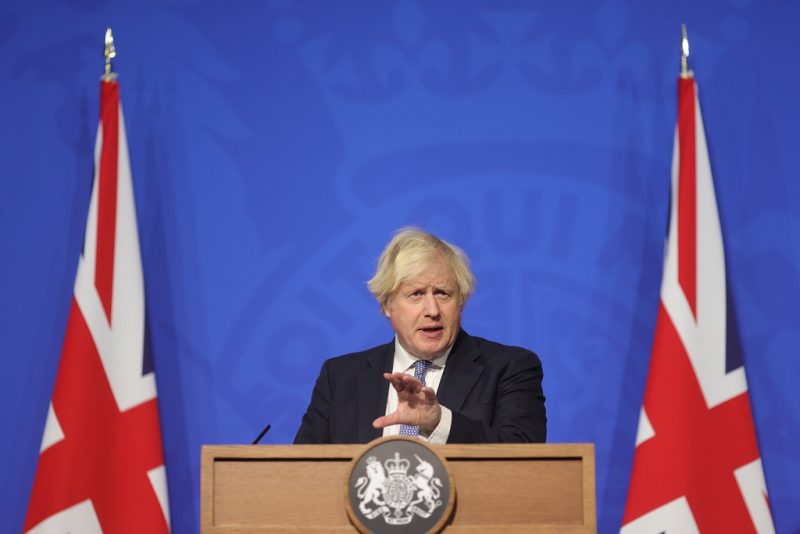 Pippa Catterall explains why Conservative MPs have been so reluctant to oust Boris Johnson in comparison to Margaret Thatcher. She writes that a big part of the reason is that Johnson resolved the Tory civil wars over Europe, and in the process of ‘getting Brexit done’ also removed many internal opposition figures around whom internal opposition could coalesce.
Pippa Catterall explains why Conservative MPs have been so reluctant to oust Boris Johnson in comparison to Margaret Thatcher. She writes that a big part of the reason is that Johnson resolved the Tory civil wars over Europe, and in the process of ‘getting Brexit done’ also removed many internal opposition figures around whom internal opposition could coalesce.
Boris Johnson’s decision to try to whip Conservative MPs to vote down the motion to trigger an investigation into whether he misled Parliament over Partygate was the latest in a number of missteps which have punctuated his career. In this instance, however, he may not manage to escape the eventual consequences, as he has so often in the past. Tory backbenchers, after all, are the group who will eventually decide his political fate. In forcing them to choose whether or not to back the Prime Minister, Johnson precipitated the very rebellion he was trying to avoid, though one which, for now, does not have fateful consequences for him.
Johnson might have thought that he could get away with this move. Conservative MPs were claiming that Partygate was not coming up on the doorsteps when canvassing in for the local elections due on 5 May. Opposition threats to endlessly remind voters of which Tories voted down investigation into Johnson nonetheless seems to have spooked enough of them into indicating that they would defy the whip and abstain. Faced with this rebellion, the government then decided to let them all abstain. As a result, the Labour motion for an investigation went through unopposed.
In the process, this little episode indicates that Johnson’s tenure of the Conservative leadership is becoming increasingly tenuous. The investigation by the Committee of Privileges might paradoxically buy him some time, especially as it will be delayed until police action over Partygate is concluded. So might a better-than-expected Tory performance in the local elections. The party leadership is trying to manage dire expectations by talking up the prospects of losing 800 councillors, in the hope that lower losses can be painted as a success of some sort rather than a damning public judgment on Johnson’s premiership. In such an event, Johnson will no doubt hope that Tory MPs will, once again, give him the benefit of the doubt. Recent events have, however, suggested that increasing numbers of them have finally concluded that he is a liability, and that Johnson is living on borrowed time.
If Johnson is eventually to be ousted by Tory MPs, he will be the first Tory leader not to fall over Europe since Ted Heath in 1975, if not Alec Douglas-Home in 1965. Europe was certainly a key faultline in the party contributing to the fall of Heath’s successor, Margaret Thatcher, in 1990. This episode provides an interesting contrast with Tory behaviour over Johnson some thirty years later.
Now we have Tories claiming that a Prime Minister cannot be changed during a war in which Britain is not involved. Yet in 1990, a Tory Prime Minister was ousted by her own party during operations in Kuwait to which Britain was deeply committed. That Prime Minister had also won three large majorities, in contrast to Johnson’s singular triumph in 2019. Additionally, she was famously hard-working and on top of her briefs – attributes not even his greater fans would accuse Johnson of. After all, Johnson missed five COBRA meetings in a row at the start of the pandemic, a dereliction of duty unthinkable under Thatcher.
Nor were there any serious questions about Thatcher’s integrity, in stark contrast with Johnson. Thatcher was ousted because she had undermined senior colleagues, was indelibly associated with the unpopularity of the poll tax, and was increasingly seen as an electoral liability, not least because of her divisive role in the growing internal Tory conflict over Europe. Crucially, as well, it was a succession of Cabinet ministers urging her to go with dignity that led to her resignation. At present, it is hard to imagine the current Cabinet playing a similar role with Johnson. Nor, giving the ongoing investigations into him, is departure with dignity really an option.
Why, then, has Johnson faced a much easier ride from Tory MPs than his distinguished predecessor? It is not as if the party were unaware of his problematic character. In 2019, shortly after Johnson became party leader, the Tories registered the name ‘Local Conservatives’ with the Electoral Commission. This label is now being widely deployed in local elections in which the Tories are scarcely mentioning Johnson’s name to mitigate the damage he is clearly doing to the Conservative brand.
It is tempting to conclude that Europe, so toxic to previous Tory leaders from Heath and Thatcher onwards, is part of the reason for Tory MPs’ unwillingness to move against Johnson. After all, he resolved the Tory civil wars over Europe by supposedly ‘getting Brexit done’. In the process, he also removed many of the remaining pro-Europeans from the party and cowed the others. One consequence is that few of the major figures around whom internal opposition could coalesce – as with Michael Heseltine in 1990 – are available to provide credible alternatives to Johnson.
Furthermore, back in 1990, Heseltine had built up a following among the party faithful by an endless round of engagements with local Conservative Constituency Associations after he walked out of Thatcher’s Cabinet in 1986. Now, those Constituency Associations seem to be much more loyal to Johnson than their counterparts were to Thatcher in 1990.
Not least, large-scale movement from UKIP into the Tories over the past few years has produced local associations which appear to be generally committed to Johnson and the kind of dog-whistles around immigration and culture wars that he embodies. In consequence, the kind of concerns that animated grassroots Conservatives in Thatcher’s era have become much less apparent in the party. Thatcherite themes such as cost-effectiveness, economic growth or law and order seem all to be relatively immaterial to local activists more concerned about sovereignty. Even law and order issues largely seem only to appeal to many activists in the context of those they label illegal migrants.
This might explain why so many of the Tory MPs who have been prepared to come out against Johnson have impeccable credentials on subjects like Brexit. They are unquestionably in line with the Eurosceptic centre of gravity in the party membership. Accordingly, they can differentiate, as Mark Harper did in his letter calling for Johnson to go, between the delivery of Brexit and the integrity expected of a Prime Minister. For others, faced with Constituency Association memberships among whom Euroscepticism and nationalism are frequently now the key touchstone issues, voicing their concern about Prime Ministerial irresponsibility may be much harder. In consequence, the Conservative Party’s existential crisis over Europe has been replaced with an existential crisis over Johnson.
_____________________
 Pippa Catterall is Professor of History and Policy at the University of Westminster.
Pippa Catterall is Professor of History and Policy at the University of Westminster.
Photo by Steve Johnson on Unsplash,







